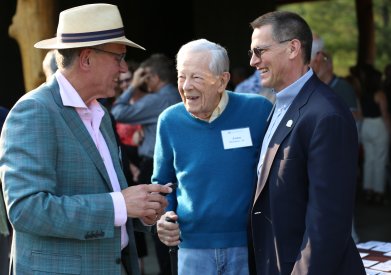Stepping Stones to Greater Trust
September 9, 2019
ABIM Foundation recently hosted its 2019 Summer Forum [Re] Building Trust: A Path Forward.. This year’s Forum succeeded in bridging fresh conversations, insights, and strategies to the central conversation of the Foundation’s 2018 Forum — fostering greater trust in health care.
Throughout the three-day meeting, a diverse group of more than 140 individuals from the health care industry explored strategies used by innovators to rebuild patient trust and discussed methods for implementing these practices at various levels of the health care system. Participants represented a broad range of people, including those from medical journals, insurance companies, medical students and, most importantly, physicians and patients.
Adding to the rich discussion, this year’s keynote speaker, Dr. Toyin Ajayi, offered her unique perspective on the relationship between physicians and patients in historically underserved communities. As Co-Founder and Chief Health Officer for Cityblock Health, Dr. Ajayi helps lead the delivery of highly personalized care, behavioral health, and social services to Medicare recipients, those who are dually eligible for Medicaid and Medicare, and lower-income patients.
“We have to start by asking our patients what trust means to them,” Dr. Ajayi stated. “We have to listen intently to their answers. We have to invite them to join us as we lean in to the messy, complex work of building, testing, and validating measures to track trust in our daily work.”
Eight medical students and residents opened the Forum by recounting how patient interactions have influenced their new careers as healthcare professionals. Their stories were chosen by the journal Academic Medicine, in initiative to hear from the next generation of doctors about the issue of trust.
Quinn Bott, PharmD, a medical student, Class of 2020, at the Uniformed Services University of Health Sciences, said it best when describing an encounter with an Apache patient on a Native American reservation in eastern Arizona: “Simple, positive interactions … are at the heart of building interpersonal trust between the providers and the indigenous people they serve.”
Other quotes that sparked my thinking were:
- “As we focus on trust, we have to ask, ‘Have I earned this person’s faith, hope and belief?’ We look away and rely on lazy proxies for trust, which are scattered around. We treat it like love, something basic that’s imputed. ‘My clinic is overbooked, revenue is up, volume doubled, so it must be there.’ That’s where the conversation has ended.” – Toyin Ajayi, MD, MPhil, Cityblock Health
- “Trust does not have only instrumental value in improving the quality of care. It has intrinsic value, because trusting relationships are rejuvenating relationships and distrusting relationships are damaging.” – Catherine Lucey, MD, UCSF
- “There is an inequitable access to and distribution of trust, and an unfair burden of the lack of trust falls on those without traditional power in our system. Trust requires at least two people; it’s incumbent upon us to pay attention to those on the lower end of that power dynamic.” – Brian Park, MD, Relational Leadership Institute at OHSU

Daniel B. Wolfson
EVP & COO, ABIM Foundation


